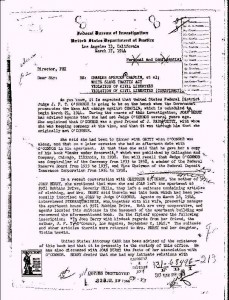Today we recall the shameful expulsion from America of Charlie Chaplin – the great film-making pioneer and veritable icon – who, with his deft touch of comedy and pathos, brought enduring pleasure to the world and generated millions of dollars for his adopted country. It was on this day in 1952 when the longstanding hate campaign against the comic genius on account of his political views finally culminated in his banishment when the US Attorney General rescinded Chaplin’s re-entry permit. Such had been Chaplin’s status, power, wealth and popularity that his reputation had hitherto survived even the most sordid sex scandals. But in the paranoid and hysterical climate of Cold War America, there was no greater crime than to be a suspected commie. And just as we would see in the 1960s when government agencies and authorities set out to destroy the counterculture by targeting rock and roll, the film industry was similarly besieged in the ’40s and ’50s. In the most high-profile of all the Hollywood witchhunts, Charlie Chaplin – whose ‘radical’ views amounted to little more than a refusal to cross picket lines during the 1945-1946 Hollywood strikes, endorsing the Progressive Party candidate Henry Wallace in the 1948 presidential campaign and publicly admiring the Soviet Union for its (allied) role in World War 2 – was singled out by the FBI for systematic ruin.
After being blacklisted for refusing to co-operate when called before the House Un-American Activities Committee, Chaplin’s career was dealt its deathblow when J. Edgar Hoover began to feed classified information and rumours to his friend, the staunchly conservative and enormously powerful Hollywood gossip columnist Hedda Hopper – who, having long despised the ‘unpatriotic’ Chaplin, was only too happy to abet. As a result of her relentless vendetta, Chaplin’s once-adoring public abandoned him in droves; xenophobic lobbyists picketed outside cinemas until virtually all bookings of his 1952 film Limelight were cancelled. And so it happened that Chaplin, who had never renounced his British citizenship in the forty-two years he’d resided in America, had to look abroad to salvage his career. Whilst sailing to London for the premiere of Limelight, he was informed that Attorney General James McGranery had rescinded his re-entry permit on suspicion of Communist inclinations and ordered the Immigration and Naturalization Service to hold Chaplin for hearings should he attempt to return.
McGranery released a tellingly opaque statement: “If what has been said about him is true, he is, in my opinion, an unsavoury character [who] has been publicly charged with being a member of the Communist Party, with grave moral charges and with making statements that would indicate a leering, sneering attitude toward a country whose hospitality has enriched him.” It would transpire that McGranery based his case on unverifiable rumours and innuendo; according to a 1952 memo, the FBI had no substantial evidence against Chaplin that could have barred his re-entry into the United States. Chaplin, however, had no such difficulties clarifying his own position. Informed that he would not necessarily be welcomed back, he retorted, “I wouldn’t go back there if Jesus Christ were president,” and surrendered his U.S. re-entry permit. “My prodigious sin was, and still is, being a non-conformist,” added Chaplin. “Although I am not a Communist I refused to fall in line by hating them.”
Chaplin would return to the United States only once, in 1972, to accept a special Oscar presented to him at the Academy Awards, where he received a standing ovation – the disloyalty and treachery of just twenty years earlier seemingly forgotten.



Pingback: America through my eyes | bblack